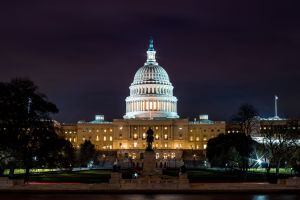Survey data shows thirty-year lows for American views of Russia.
Americans Support Congressional Inquiry into Russian Hack
High-profile Republican stalwarts John McCain and Lindsay Graham have contradicted President-elect Donald Trump’s dismissal of CIA conclusions that Russia interfered in the US presidential election. The two senators issued a statement along with Democrats Jack Reed and Charles Schumer calling for a special committee to investigate the Russian cyberattacks. In a joint statement issued December 11, the senators warned that "this cannot become a partisan issue" because Russian interference in the election "should alarm every American."
But among the American public, there is a partisan split on whether to investigate further, and self-described Republicans seem to be taking their cues from Trump rather than the senators. A just-completed Chicago Council Survey conducted over the past weekend (December 16-18) finds that a narrow majority of Republicans oppose a congressional inquiry (51%). By contrast, majorities of Democrats (85%) and Independents (64%)—and two-thirds of the overall public—favor an investigation.
Support for Congressional Investigation into Russian Election Interference
As you may know, there have been bipartisan calls for a congressional inquiry into Russian interference in US elections. These calls came after the Central Intelligence Agency (CIA) concluded the Russian government was involved in cyberattacks against American political organizations during the presidential campaign. Do you personally favor or oppose a congressional investigation into Russian actions?
Views of Russia Decline to 30 Year Lows, Especially Among Democrats
At the same time, however, the survey shows a downturn in overall American views of Russia. When asked their feelings toward Russia on a temperature thermometer scale from 0⁰ (a very cold, unfavorable feeling) to 100⁰ (a very warm, favorable feeling), Americans rated Russia an average of 32 degrees, the lowest rating recorded in the last thirty years of Chicago Council Surveys. This represents a sharp 8-degree drop from June 2016, when Americans gave Russia an average rating of 40 degrees, and is lower even than readings in 2014 when Russia annexed Crimea.
American Views of Russia
Please rate your feelings toward some countries and peoples, with one hundred meaning a very warm, favorable feeling, zero meaning a very cold, unfavorable feeling, and fifty meaning not particularly warm or cold. You can use any number from zero to one hundred, the higher the number the more favorable your feelings are toward that country or those people.
Democrats, in particular, have shifted in a cooler direction, rating Russia on average 40 degrees last June to a chilly 28 degrees today. This is the second-lowest temperature rating of Russia ever recorded among Democrats, on par with Cold War-era ratings of 1978-1986. Independents’ views of Russia also have dropped since June from an average rating of 42 degrees to a cooler 35 degrees in December, the lowest rating recorded for Russia among Independents since the Cold War. Republicans rate Russia at about the same level now as in June (38 degrees in June, 35 degrees in December, within the margin of error), also near Cold War levels.
A recent Economist/YouGov poll conducted earlier this month showed similar partisan patterns. Overall only 21 percent of Americans express a favorable view of Russian President Vladimir Putin, with 12 percent of Democrats versus 37 percent of Republicans viewing Putin favorably. In fact, Republican favorable impressions of Putin had increased incrementally from 10 percent in July 2014 to 24 percent in September 2016. By December 2016, Republicans’ favorable views of Putin increased again to 37 percent, perhaps reflecting the more positive attitude toward Russia displayed by the GOP’s new leader, President-elect Trump. This finding prompted President Obama to quip in a December 16 press conference that “Ronald Reagan would roll over in his grave.”
Americans Perceive Opposing Approaches but Would Welcome Cooperation
The Chicago Council on Global Affairs’ June 2016 survey found that roughly two in three Americans across party lines said that the United States and Russia were working in different rather than the same directions on ending the conflict in Syria, limiting Iran’s nuclear program, and reducing nuclear weapons worldwide1 (even though at the time, the two countries were in fact cooperating on some of these issues).
These results suggest a lack of awareness about areas of US-Russia cooperation rather than outright opposition to cooperation with Russia. The new December Chicago Council Survey results find that roughly eight in ten Americans said they would favor rather than oppose cooperation on ending the conflict in Syria (78%), limiting Iran’s nuclear program (79%), and reducing nuclear weapons worldwide (80%). There are very little if any differences across partisan groupings.
Conclusion
A majority of the American public seems unsettled by Russia’s cyber-intrusion as evidenced by overall declines in favorable views of Russia. Even a sizable portion of Republican supporters favor a congressional inquiry. At the same time these results plainly reveal a partisan bias among the public most likely because Russian efforts are viewed as beneficial to Republican candidates or positions. They also demonstrate Trump’s ability to influence Republican public opinion on this issue. Come January, Trump’s cabinet is likely to include both some traditional hawks (like James Mattis for Secretary of Defense) and more Russia-friendly appointments, (like Rex Tillerson as Secretary of State). Given this mélange, it will be interesting to see how Russia policy – and American attitudes toward Russia – take shape in the coming year.
Survey Methodology
This Chicago Council Survey brief is based on data from an omnibus survey conducted by GfK Custom Research using their large-scale, nationwide online research panel between December 16-18, 2016, among a national sample of 1,005 adults, 18 years of age or older, living in all 50 US states and the District of Columbia. The margin of sampling error for the full sample is ±3.0 percentage points, and higher for partisan subgroups (±5.7 for Republicans, ±5.5 for Democrats, and ±5.0 for Independents).
- 1
US and Russia: Insecurity and Mistrust Shape Mutual Perceptions, by Stepan Goncharov, Dina Smeltz, Lily Wojtowicz. Published November 4, 2016.






